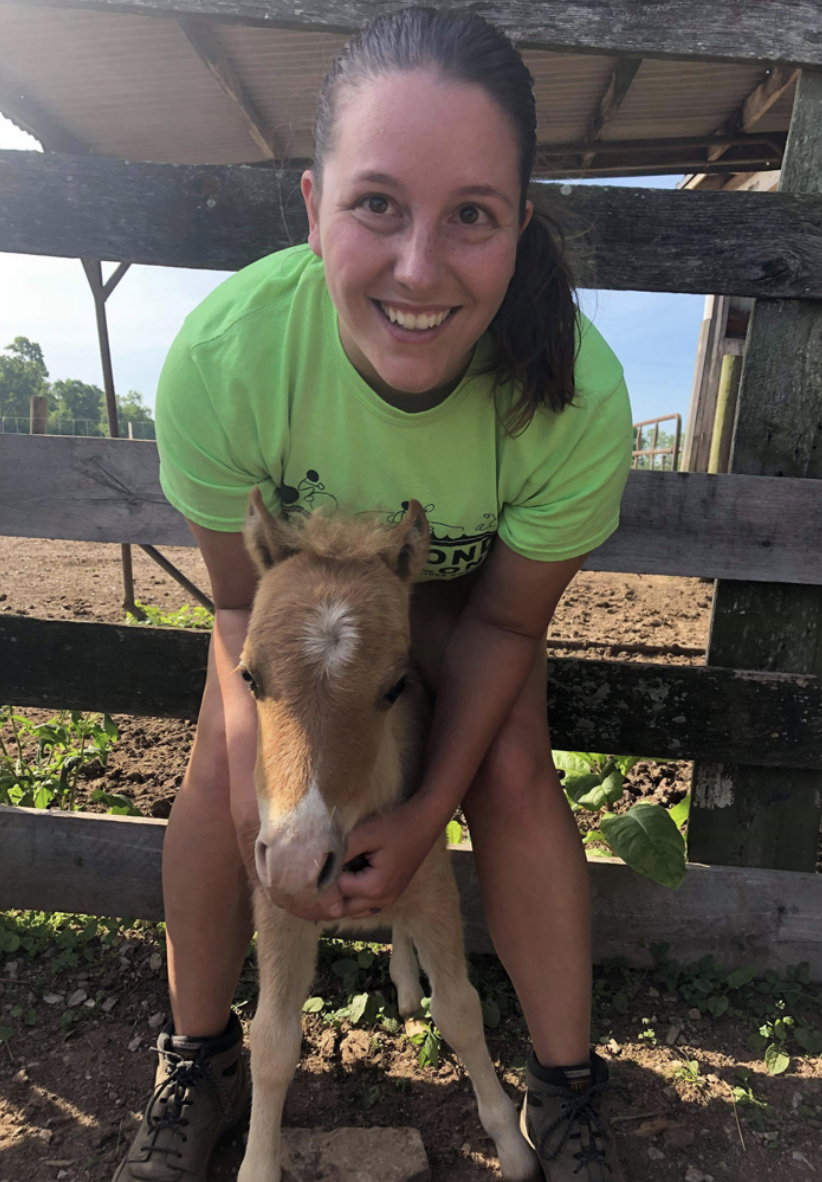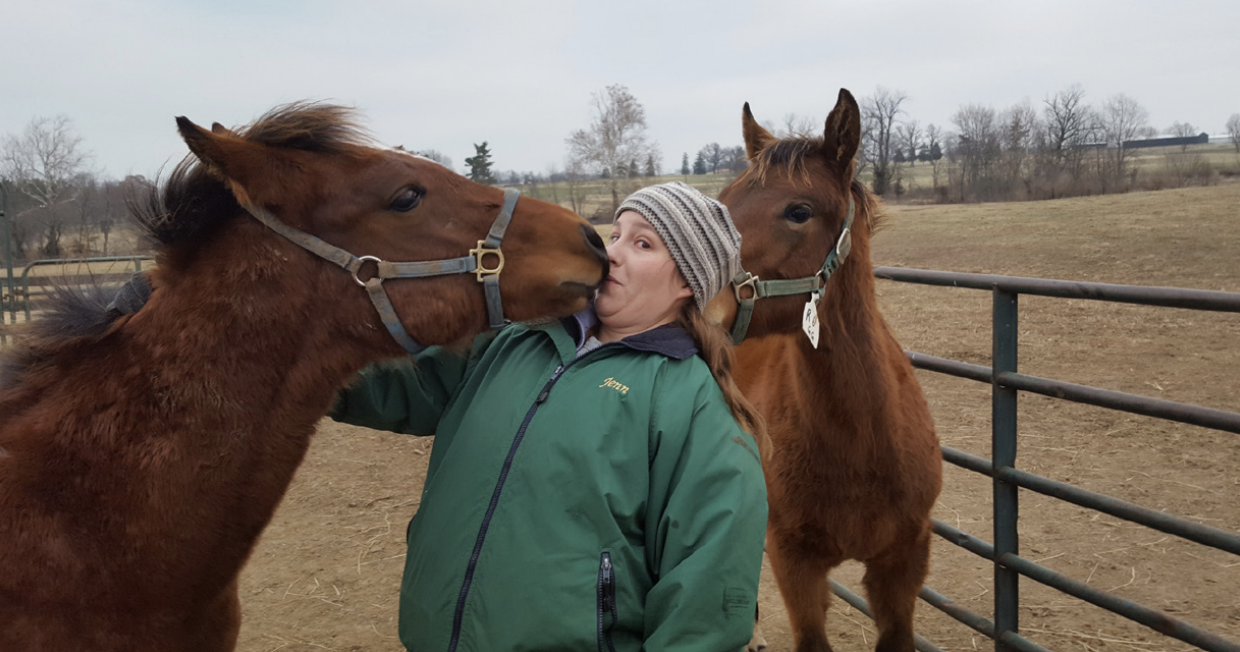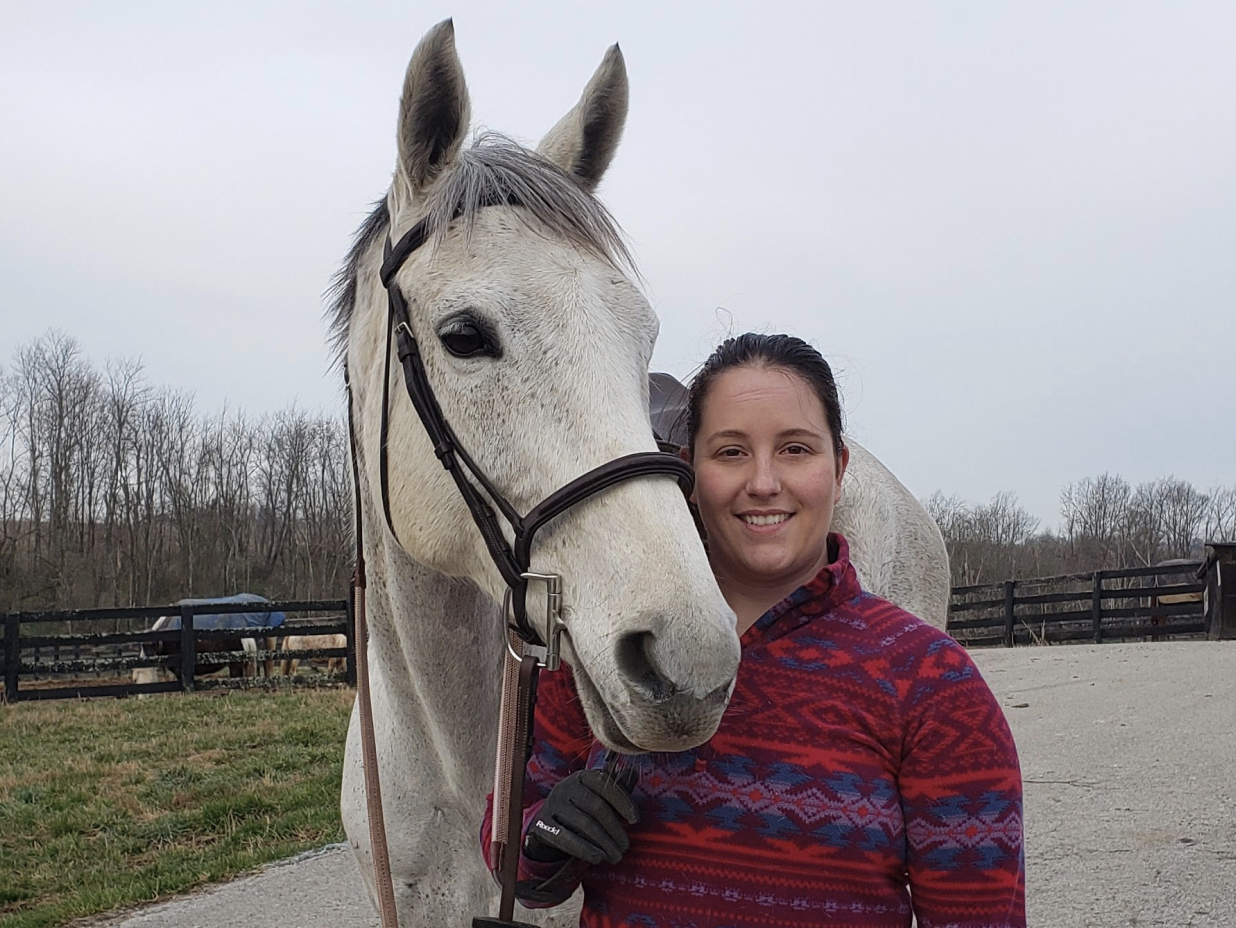Graduate Student Spotlight: Jennifer Cain
In late July, I had the opportunity to speak with Jennifer Cain, a doctoral candidate in the parasitology laboratory of Martin Nielsen, DVM, PhD, in the University of Kentucky Department of Veterinary Science at the Gluck Equine Research Center, about her work as a graduate research assistant and her career plans.
Before joining the parasitology lab, Cain already had a rich work history. She worked in the Kentucky State Police Forensics Labs as a forensic biologist and served in the U.S. Army as a public health official, including a posting to South Korea. She has published two research papers in peer-reviewed journals, given multiple presentations and received funding for a pilot study from the National Center for Veterinary Parasitology. Cain and her husband own a 25-acre farm near Danville, Kentucky, where she keeps her two Off-The-Track-Thoroughbreds. She has two mares, a gray mare named Sterling, who she shows in jumpers and dressage, and a new project mare, Cecilia, who is going to be a hunter.
 Can you describe your main responsibilities in the parasitology lab?
Can you describe your main responsibilities in the parasitology lab?
I help oversee and mentor undergraduate research projects, write grants and publications, attend and present at research conferences, help collect samples and work with horses at the research farm and work on my own research. I just had one paper published and two more that I am working on, as well as three grants that are being submitted this summer/fall. My main project, which is my dissertation project, is focused on the microbiome of the equine roundworm, Parascaris spp. Currently, I am characterizing the microbiome of female and male parasite gonad and intestine. I plan to do the same for the whole organism microbiome at difference life stages, as well as some in vitro drug studies to see how anthelmintics and antibiotics affect parasite viability and their microbiome, and how those two things correlate. The goal is to determine if there are any bacteria that may be important for parasite survival, and therefore potential drug targets.
What interested you in this area of research? How did you get the opportunity to work for Dr. Nielsen?
My master’s degree was through a distance program while I was in the U.S. Army and stationed at Fort Polk, Louisiana. I chose to do a research project as part of my program, and since there is a large population of feral horses at Fort Polk, I figured they would make great candidates for research.
The base veterinarian, Katie Jarisch, DVM, helped me come up with a parasitology project that would allow me to collect good data without having to come into contact with the horses. I spent a few months staring at these feral horses and collecting their feces for the project, and in the process of developing the project and writing the paper for it, I cited a large amount of Dr. Nielsen’s papers.
I knew I wanted to get my Ph.D. at UK because I’ve wanted to live in Lexington my entire life, so I started contacting people in the biology department as well as forestry due to an interest in wildlife biology. I was directed to Gluck and Dr. Nielsen, although I was not very confident that I would be accepted. I emailed Dr. Nielsen and we chatted on the phone, and he said he would be happy to have me in his lab. The rest is history!
How would you describe the lab? What are you most proud of?
We have a fantastic lab family. We take a large number of undergraduates to help with lab work and also provide many opportunities for people to do their own projects. Many of them have ended up with publications. That is something I never had a chance to do as an undergraduate, and I think it’s really great that we give people those opportunities. Dr. Nielsen makes all of this possible. He is a fantastic mentor and has created a great lab environment that develops wonderful scientists, with a sprinkling of fun.

What equine parasite worries you the most? Why?
I would not necessarily say that any equine parasite in particular worries me – I use strategic deworming practices for my two mares at home and otherwise am not concerned about parasites. The most pathogenic parasites of horses, however, is Strongylus vulgaris, a large strongyle. While it has been essentially eliminated from domestic horses due to the efficacy of ivermectin and early treatment practices targeting it in particular, there are still reservoirs of this parasite. Domestic horses that are not treated, such as our research herd, may have this parasite, as well as feral horses, such as those at Fort Polk. Feral horses that are adopted out could be of particular concern because they may shed S. vulgaris eggs on pasture, which is why it is important to include parasite concerns in quarantine procedures overseen by a veterinarian when introducing feral horses into domestic herds.
What do you think most horse owners get wrong about parasites?
That they are these big scary monsters out to kill their horses and must be eliminated at all costs. Cyathostomins are found in horses worldwide, and are mild pathogens that only cause clinical disease when burdens are high, so the goal of management programs is just that – management, rather than elimination.
What developments or changes do you see in the coming years for deworming protocols? Do you think people will deworm more effectively? Will better/ different dewormers be available?
Well, I’m hoping that we see people move more toward management programs that use fecal egg counts and reduce the number of anthelmintic treatments used. Essentially, I hope people follow the American Association of Equine Practitioners guidelines.
This is how we will preserve currently effective anthelmintics for as long as possible, and how horse owners can ensure they are using products that are still effective. We certainly hope thatnew products will be available, because the situation right now regarding drug efficacy and anthelmintic resistance is not great.
What parts of your job do you love? What do you like least?
I love the variety. We have a lab that is focused on equine parasites, but we do many different types of projects revolving around them, from basic biology to immunology to gene expression and beyond.
I think it is very beneficial to have the exposure to a variety of different fields despite being heavily focused on only a few groups of equine-specific parasites. The back end of the horses is the part that I like the least!
Do you get to do a lot of fieldwork?
Yes! We work with our research horses weekly. We have a herd of mixed-breed full-size horses that have not been dewormed since 1979, and a herd of miniature horses whose parasites are doubledrug resistant.
Once you’ve completed your Ph.D., what do you hope to do?
I’ve discovered a passion for scientific writing and editing in particular. I hope to make a career out of it.
UK is a land-grant university. What part of the three missions (academics, research, Extension) do you actively work on? Are you looking forward to writing, research, teaching, outreach or perhaps a combination?
Research and extension services are our main focuses. Naturally, my Ph.D. is focused on research, but we also do a lot of outreach work in our lab. We go to some of the large Thoroughbred farms in the area and talk to them about their parasite control programs, which has led to some really amazing opportunities to talk to well-known people in the Thoroughbred industry, as well as meeting some famous horses.

What are some of your plans for the next year, either in the lab/school, with your horse and/or personally?
Next year I will be attending the American Association of Veterinary Parasitologists conference in Lexington, the World Association for the Advancement of Veterinary Parasitology conference in Dublin, Ireland, and the Equine Infectious Diseases conference in Normandy, France.
I plan on showing Sterling in the 2’6” – 2’9” jumpers, and Cecilia in the green horse hunter cross rails. Hopefully we will do well at TIP Championships!
Karin Pekarchik, MS, senior extension associate for distance learning and founder of the UK Female Equestrian Health and Wellness Community of Practice, provided this information.
